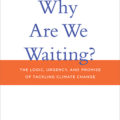‘To slow or not to slow’ (Nordhaus, 1991) was the first economic appraisal of greenhouse gas emissions abatement and founded a large literature on a topic of worldwide importance. We offer our assessment of the original article and trace its legacy, in particular Nordhaus’s later series of ‘DICE’ models. From this work, many have drawn the conclusion that an efficient global emissions abatement policy comprises modest and modestly increasing controls. We use DICE itself to provide an initial illustration that, if the analysis is extended to take more strongly into account three essential elements of the climate problem – the endogeneity of growth, the convexity of damage and climate risk – optimal policy comprises strong controls. read more »



